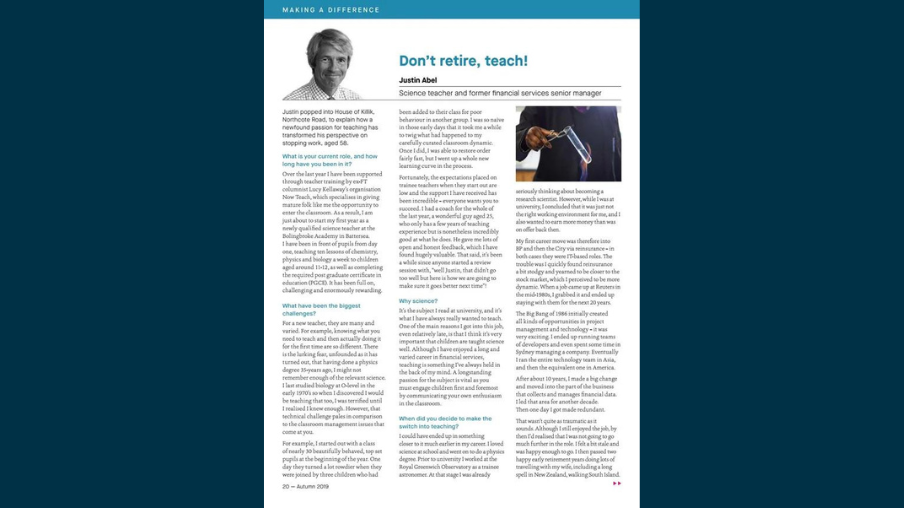Investment company Killik & Co interviewed Now Teacher Justin Abel about how a newfound passion for teaching has transformed his perspective on stopping work, aged 58. Below is a shortened version of the interview, see the full article, published in Confidant, Killik's flagship quarterly magazine here.
What is your current role, and how long have you been in it?
Over the last year I have been supported through teacher training by ex-FT columnist Lucy Kellaway’s organisation Now Teach, which specialises in giving mature folk like me the opportunity to enter the classroom. As a result, I am just about to start my first year as a newly qualified science teacher at the Bolingbroke Academy in Battersea. I have been in front of pupils from day one, teaching ten lessons of chemistry, physics and biology a week to children aged around 11-12, as well as completing the required post graduate certificate in education (PGCE). It has been full on, challenging and enormously rewarding.
Why science?
It’s the subject I read at university, and it’s what I have always really wanted to teach. One of the main reasons I got into this job,even relatively late, is that I think it’s very important that children are taught science well. Although I have enjoyed a long and varied career in financial services, teaching is something I’ve always held in the back of my mind. A longstanding passion for the subject is vital as you must engage children first and foremost by communicating your own enthusiasm in the classroom.
When did you decide to make the switch into teaching?
I could have ended up in something closer to it much earlier in my career. I loved science at school and went on to do a physics degree. However my first career-move was into the City via reinsurance – in both cases they were IT-based roles. The Big Bang of 1986 initially created all kinds of opportunities in project management and technology – it was very exciting. I ended up running teams of developers and even spent some time in Sydney managing a company. Eventually I ran the entire technology team in Asia, and then the equivalent one in America. Then one day I got made redundant. That wasn’t quite as traumatic as it sounds. Although I still enjoyed the job, by then I’d realised that I was not going to go much further in the role. I felt a bit stale and was happy enough to go. Around that time I spotted an article by FT columnist Lucy Kellaway about Now Teach. It was a “lightbulb” moment– suddenly I could see a path to doing something I had always wanted to try, with the right support from day one.
In what ways have Now Teach helped?
At the beginning of the programme they got me through a lot of basic admin, such as the tricky online grammar and maths tests you need to pass to become a teacher. More important, however, is the strength and breadth of my Now Teach peer group who offer a great forum for talking about some of the frustrations faced by maturing wannabe teachers. My peers include a tech entrepreneur, a management consultant, an ex-airline-pilot, a couple of ex-military folk and a number of people who have come in from corporate roles, particularly in the City. I’m at the slightly older end of the spectrum – I’d say the range is mid-40s to late 50s. Whilst it is wonderful going back to being a trainee, there are also headaches. You start at the very bottom of the organisation in a new school, so it’s great to be able to talk to people who understand your gripes and can share theirs in a safe environment.
What would you say to the 18-year old you?
Whilst I am broadly happy with the way my career worked out, I think I would say to myself, “take a risk and be prepared to change”. During my career I wandered around taking a mixture of the paths of least resistance and the best opportunities available at the time. I think that’s fine,but I would probably advise myself to try a few different things along the way. For example, I sometimes wish I’d been a bit more entrepreneurial and gone out by myself. Quite a few of my Now Teach peers stayed in jobs they didn’t love and now rather wish they’d left sooner.
To read Confidant's full interview with Justin Abel, click here.
“I think I would say to myself, “take a risk and be prepared to change”.

